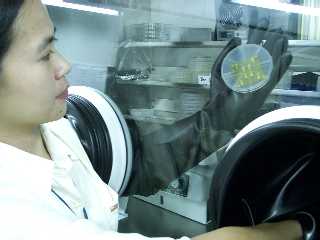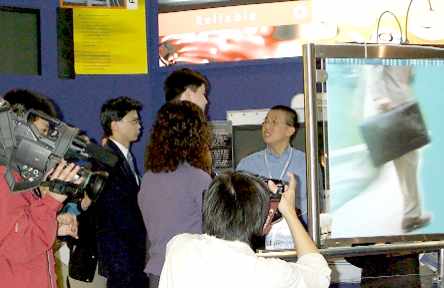
This is Low Hong Yee, a researcher at the Institute of Materials Research & Engineering in Singapore. She’s emblematic of the nation’s rise to influence and, to a degree, its future.
More in my Sunday column.
Wall Street’s Financial Flunkies
Gretchen Morgenson (New York Times; registration required): Memo to Analysts: Thanks for Nothing. Your inability to see trouble at a company when it is staring you in the face — so that you could alert your customers to problems before their stocks plummet — has cost us billions of dollars in recent weeks. Your performance is a disgrace.
It’s a disgrace, all right, but it’s not a surprise.Morgenson has been one of the best financial journalists for long time. Investors would have been far better off to listen to her than the “analysts” who have been such patsies for the companies they follow.
In too many cases, Wall Street analysts have been little more than public-relations aides for the companies they follow. And, not coincidentally, those companies’ stock offerings have often been underwritten by the investment banks that employ the analysts.
Sadly, the people in my business keep quoting them as if they were the oracles of our times. Yes, analysts can say intelligent things. They are not stupid people. But anyone — investor or journalist — who trusts their investment recommendations is gullible. No, foolish.
The analysts who helped their investment banks make mega-millions in IPO, secondary-offering and M&A fees over the past few years have probably earned their outrageous paychecks. Unfortunately, I fear, the public hasn’t realized who the analysts were working for — and all too often, it plainly wasn’t the investing public.
Richard Li, Superstar

The man in the blue shirt in the middle of this picture is Richard Li, chief executive of Pacific Century CyberWorks (PCCW), a company that has become the symbol of Hong Kong’s technology community. It soared to the highest heights early this year, but has fallen to some deep lows in recent weeks.
Li is the most visible business person in Hong Kong these days. He’s surrounded by cameras in every venue. Here, he’s stopping by the International Telecommunications Union’s Telecom Asia 2000 show and forum, where PCCW is a major sponsor.
Its sponsorship makes sense. Earlier this year, PCCW bought the largest telephone company in Hong Kong, based largely on a share price that is no longer even in the same universe that it was at the time. Call it luck, or a brazen, legal theft. Now PCCW is more of a telecommunications company than anything else.
I profiled Li and his company during my visit here last year. I’ve been talking with lots of the top managers at the company since coming back to Hong Kong early in November, and I’m planning a major update. This is one fascinating company.
